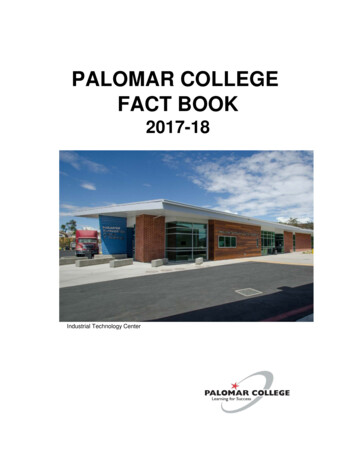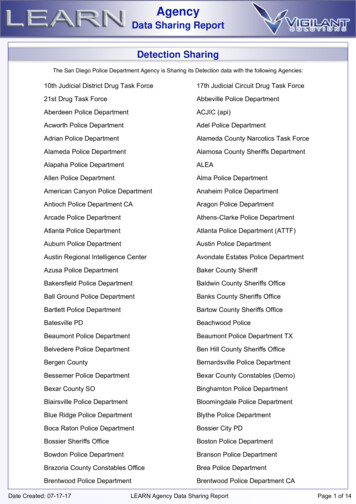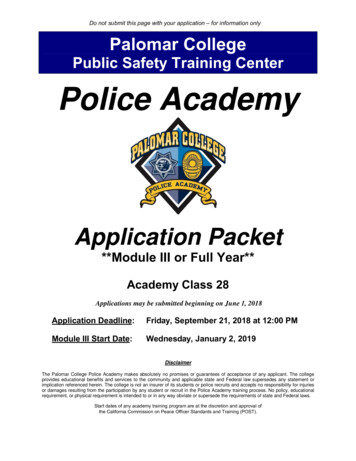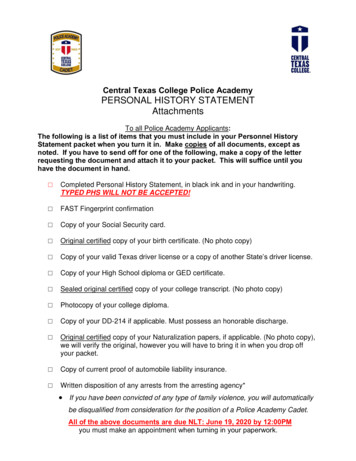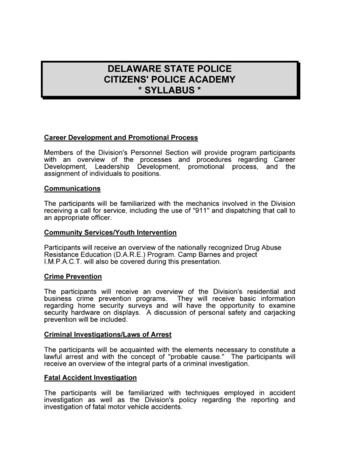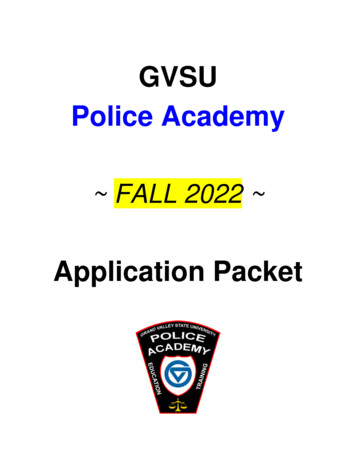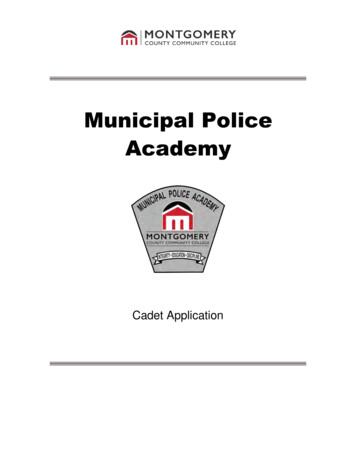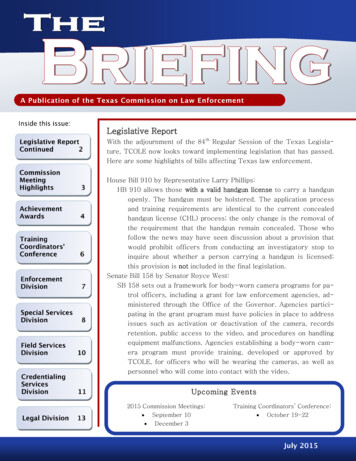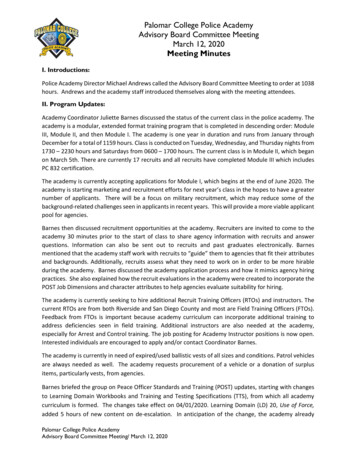
Transcription
Palomar College Police AcademyAdvisory Board Committee MeetingMarch 12, 2020Meeting MinutesI. Introductions:Police Academy Director Michael Andrews called the Advisory Board Committee Meeting to order at 1038hours. Andrews and the academy staff introduced themselves along with the meeting attendees.II. Program Updates:Academy Coordinator Juliette Barnes discussed the status of the current class in the police academy. Theacademy is a modular, extended format training program that is completed in descending order: ModuleIII, Module II, and then Module I. The academy is one year in duration and runs from January throughDecember for a total of 1159 hours. Class is conducted on Tuesday, Wednesday, and Thursday nights from1730 – 2230 hours and Saturdays from 0600 – 1700 hours. The current class is in Module II, which beganon March 5th. There are currently 17 recruits and all recruits have completed Module III which includesPC 832 certification.The academy is currently accepting applications for Module I, which begins at the end of June 2020. Theacademy is starting marketing and recruitment efforts for next year’s class in the hopes to have a greaternumber of applicants. There will be a focus on military recruitment, which may reduce some of thebackground-related challenges seen in applicants in recent years. This will provide a more viable applicantpool for agencies.Barnes then discussed recruitment opportunities at the academy. Recruiters are invited to come to theacademy 30 minutes prior to the start of class to share agency information with recruits and answerquestions. Information can also be sent out to recruits and past graduates electronically. Barnesmentioned that the academy staff work with recruits to “guide” them to agencies that fit their attributesand backgrounds. Additionally, recruits assess what they need to work on in order to be more hirableduring the academy. Barnes discussed the academy application process and how it mimics agency hiringpractices. She also explained how the recruit evaluations in the academy were created to incorporate thePOST Job Dimensions and character attributes to help agencies evaluate suitability for hiring.The academy is currently seeking to hire additional Recruit Training Officers (RTOs) and instructors. Thecurrent RTOs are from both Riverside and San Diego County and most are Field Training Officers (FTOs).Feedback from FTOs is important because academy curriculum can incorporate additional training toaddress deficiencies seen in field training. Additional instructors are also needed at the academy,especially for Arrest and Control training. The job posting for Academy Instructor positions is now open.Interested individuals are encouraged to apply and/or contact Coordinator Barnes.The academy is currently in need of expired/used ballistic vests of all sizes and conditions. Patrol vehiclesare always needed as well. The academy requests procurement of a vehicle or a donation of surplusitems, particularly vests, from agencies.Barnes briefed the group on Peace Officer Standards and Training (POST) updates, starting with changesto Learning Domain Workbooks and Training and Testing Specifications (TTS), from which all academycurriculum is formed. The changes take effect on 04/01/2020. Learning Domain (LD) 20, Use of Force,added 5 hours of new content on de-escalation. In anticipation of the change, the academy alreadyPalomar College Police AcademyAdvisory Board Committee Meeting/ March 12, 2020
implemented the new content. LD 3 is being renamed to Principled Policing in the Community. This LDadded 8 hours of training on Principled Policing, Implicit Bias and Procedural Justice; LD 35,Firearms/Chemical Agents, eliminated the four Basic Handgun and Shotgun qualifications as requiredExercise Tests, but the academy is keeping them as a part of our firearms training program. LD 34, FirstAid/CPR/AED, added an additional Required Learning Activity. LD 42, Cultural Diversity/Discrimination,added a new chapter on Sexual Orientation and Gender Identity, although the TTS did not change. Lastly,a new workbook is being developed to replace a long absent LD 14. The Workbook will be titled OfficerWellness and curriculum is currently being developed to add into academy training. The academycurrently has wellness training incorporated into Academy-specific content, but it will be beneficial forthere to be POST content on the topic.POST moved to Comprehensive Tests a few years ago to replace individual LD tests. The Test Committeeis currently assessing questions where the majority of recruits across the state fail to answer correctly(70% or more). The Committee is soliciting feedback from academies on the Learning Objectives beingtested and have shared information of commonly failed objectives seen in statewide test results.Coordinator Barnes is on the POST Scenario Committee and advised all scenario test scripts are beingreviewed and revised, and new scripts are being written. There will be changes to the Use of Force teststhat will eliminate one of the scenario tests completed, so there will be 13 total tests. Some point valueson competencies tests will also be adjusted. Most changes are expected to take effect in October butscript revisions are ongoing.The Basic Course Waiver process has changed and the 136-hour requalification course is now required asa part of the waiver process. Lastly, POST updated regulations to define required qualifications forAcademy personnel/staff.III. Program Development:The San Diego County Sheriff’s Department is contracting with Palomar College to present a SponsoredModule III Reserve Academy. The Sponsored Reserve Academy is set to begin on March 31, 2020, andwill be for a total of 13 weeks on a slightly different schedule from the regular program. Training will beon Tuesdays and Thursdays for 4 hours and Saturdays for 8 hours. The academy will be less physicallyintensive and not as demanding as the traditional academy program. Differences in the program willinclude agency-specific training during the “Admin Time” portion of the academy hours, to include 800MHz radio training, prisoner transport training, and Body Worn Camera training. The police academyhopes that other agencies may have interest in sending Level III Reserve candidates to the SponsoredReserve Academy in the future. It is difficult to find people who will pay the cost to attend the academyto work for free at an agency. The cost of the program to the agency is a fraction of what it costs anindividual to attend since the agency will provide the uniforms, equipment and other required materials.Coordinator Barnes shared information provided by the POST Consultant who manages the Field TrainingProgram. The top three problems currently seen in field training across the state are Report Writing,Multitasking (scenarios), and a Generational Lack of Social Development. The academy is trying to addressthese common issues during academy training and welcomes feedback from agencies. The Academy willbe introducing a Pre-Academy for next year’s academy class that will address some of these deficiencies,to include communication/engagement, leadership, report writing, and physical fitness.Palomar College Police AcademyAdvisory Board Committee Meeting/ March 12, 20202
Barnes then discussed new course development. The academy hopes to offer Advanced Officer Training(AOT) courses, however enrollment in the past has not been high enough to hold the classes. The academycan currently offer Report Writing on three levels: Basic, Intermediate, and Advanced. The Basic coursewould work well for personnel that may have never attended an academy but write reports. TheIntermediate level is best as a refresher course for those who struggle with report writing or have workedin a custody setting since the academy and are moving to patrol. The Advanced level is intended forpersonnel moving into investigative duties. Barnes stressed the need for enrollment numbers in order torun any AOT course.The academy is striving to increase enrollment in the program through marketing and networking withagencies. The academy is working with the Camp Pendleton Education Center for increased marketingtowards transitioning military personnel and veterans. Palomar College offers military personnel theWells Fargo First Responders Grant of 2555 that can reimburse recruits for ancillary academy costs, suchas uniforms and equipment. Palomar College Police Academy also offers 43.5 units towards an Associate’sDegree upon completion of the program (Modules III, II and I), which assists recruits will achievingacademic goals as well.Barnes encouraged agencies to refer their “non-select” applicants to the police academy program. Theseinclude applicants that are not selected for entry level positions due to lack of life experience or someother factor that would not bar employment in the future. Many “non-selects” are encouraged to reapplyin the future, but by encouraging applicants to self-sponsor through the academy, the agency can furtherevaluate the candidate through their performance in law enforcement training and hire them as anacademy graduate, which is a cost savings for the department. The police academy would also likepermission to attend an agency’s entry level testing to briefly share information with applicants about theacademy in case the entry level hiring does not result in employment.Coordinator Barnes asked agencies what courses are needed in the region and noted that they could beheld at Palomar. Sergeant John Russo of the Escondido Police Department asked about driving simulatoroptions. Director Andrews shared with the group that the academy procured a MILO Range Pro ForceOption Simulator last year through Perkins Grant funding. It is being utilized in academy training andintended for use for AOT courses also. He is in the process of trying to obtain a driving simulator. Andrewsshared his background as a Commander for the Riverside County Sheriff’s Department and his role indeveloping the Ben Clark Training Center. He shared that the academy wants to offer what agencies arelooking for and their feedback is vital to developing relevant courses. Andrews and Barnes discussed howthey are looking for feedback and communication to best serve the needs of the region.Chief Chris Moore of the Palomar College Police Department shared that he is an academy instructor andpraised the recruits’ dedication and investment to their training. He mentioned that the recruits balancemany things while attending the academy, such as work, family, and academics. He encouraged localagencies to being open to hiring academy graduates.There was a comment made by a San Diego Police Department representative about academy graduatesfrom another program being hired and then failing their firearms qualification because it had been manymonths since they had completed firearms training. Barnes explained that the final firearms training is inthe first half of Module I (Module I is between late June and December) and is usually completed inSeptember, but that training can be restructured so that firearms happens later in the year or a refresherPalomar College Police AcademyAdvisory Board Committee Meeting/ March 12, 20203
could be added close to the end of the academy to assist with proficiency. Recruits are always encouragedto practice on their own as well, which is necessary for any perishable skill.A question was asked about academy graduate applicants having backgrounds issues and if that wasrelated to a need for enrollment numbers at the college. Coordinator Barnes briefly went over theapplication process for the police academy, which includes a Pre-Investigative Questionnaire (PIQ) that isreviewed with the applicant during the interview. Applicants are advised of hirability issues based off theinformation they provide. Barnes shared that strong enrollment numbers is always a concern for anycollege-based program, however the admissions process to the academy is maintained solely by Academypersonnel. The challenges the academy is seeing with applicant background issues is consistent with whatagencies are seeing as well. Director Andrews explained how college funding has changed recently andthat revenue is now based on completion rates, not just enrollment numbers. He noted that the academyseeks to accept quality applicants and additional marketing and recruitment is expected to increase theapplicant pool.VI. Future Advisory Board Meetings:The police academy plans to hold an Advisory Board Committee Meeting annually each Spring.VII. Open Forum/ Q&A:The meeting opened up to Q&A for all attendees.Captain Jeff Maxin of the San Diego County Sheriff’s Department talked about his agency’s acquisition ofa mobile range trailer, which can be moved to various sites for training. They are also underway with thedevelopment of their Emergency Vehicle Operations Center near the border.Daniel Schmitt introduced himself as the POST Region 10 Training Consultant, covering Imperial, Orangeand San Diego counties. Prior to working for POST, he worked at the San Diego Police Department andSan Diego County District Attorney’s Office. Schmitt offered to answer any questions anyone hadregarding training or POST requirements.Chief Moore asked Schmitt about POST’s stance on marijuana use with backgrounds/ hirability. Schmittstated that policies regarding marijuana use (and other drug use) were to be determined individually byagencies and departments. POST does not dictate time periods related to drug use or criminal activity inthe background investigation process.Various agency personnel asked questions regarding what the academy does for pre-employment trainingand brought up seeing writing issues in the field with new hires from any academy. Coordinator Barnesshared information about the Employment Preparation course in the academy. The academy aims toguide recruits to apply to agencies that match their backgrounds, providing a realistic assessment torecruits as to the challenges they may face in the hiring process. Barnes discussed the writing issues seenwith many incoming recruits and that applicants are recommended to have a strong foundation in Englishand writing comprehension skills before entering the program. The college has many resources availablefor those who are struggling, but it is up to the student to utilize them.The Sponsored Reserve Academy was briefly discussed and a few different agency personnel added thatthey have seen very positive changes in the academy in the last few years.Palomar College Police AcademyAdvisory Board Committee Meeting/ March 12, 20204
VIII. AdjournmentThe meeting was adjourned at approximately 1139 hours by Director Andrews.Attendees:Michael G. Andrews, Police Academy Director, Palomar CollegeJuliette Barnes, Police Academy Coordinator, Palomar CollegeYolande Reilly, Academic Department Assistant – Public Safety Programs, Palomar CollegeAshley Sherrell, Career Technical Program Specialist, Palomar College – Police AcademyChris Moore, Chief, Palomar College Police DepartmentAaron Grant, RTO/ Instructor, Palomar College Police AcademyBob Sterling, RTO/ Instructor, Palomar College Police AcademyRandy Soulard, Lieutenant, El Cajon Police Department - TrainingJoe Crawford, Sergeant, El Cajon Police Department – TrainingEd Varso, Chief, Escondido Police DepartmentEric Skaja, Captain, Escondido Police Department – Services BureauJohn Russo, Sergeant, Escondido Police Department – Training DivisionChristopher Sullivan, Lieutenant, National City Police Dept. – Internal Affairs/ Backgrounds & RecruitingDaniel Schmitt, Senior Consultant, Peace Officer Standards and TrainingJohn Morris, Captain, San Diego Police Department – Training DivisionSteve Waldheim, Lieutenant, San Diego Police Department – Personnel DivisionKevin Wong, Lieutenant, San Diego Police Department – Regional AcademyJeff Maxin, Captain, San Diego County Sheriff’s Department – Training DivisionBrian Nevins, Captain, San Diego County Sheriff’s Department – Emergency Services DivisionMatthew Blumenthal, Lieutenant, San Diego County Sheriff’s Dept. – Personnel DivisionDavid Landman, Officer, San Diego Unified School District Police Department – Safe SchoolsJohn Smart, Sergeant, University of California San Diego Police Department – Patrol DivisionPalomar College Police AcademyAdvisory Board Committee Meeting/ March 12, 20205
Academy Coordinator Juliette Barnes discussed the status of the current class in the police academy. The academy is a modular, extended format training program that is completed in descending order: Module III, Module II, and then Module I. The academy is one year in duration and runs from January through December for a total of 1159 hours.
